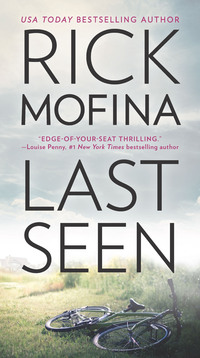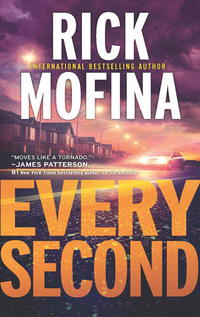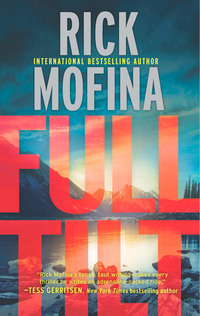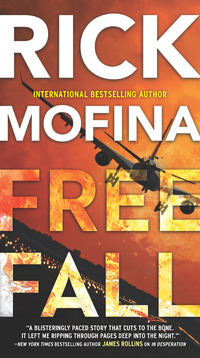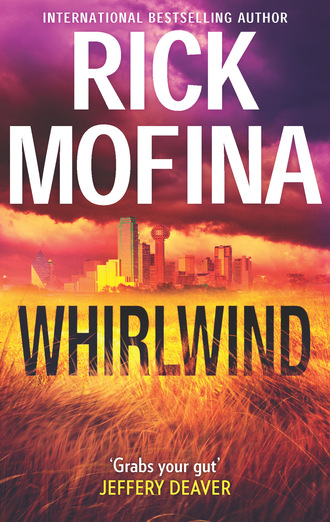
Полная версия
A Kate Page novel
“Yes, we’ve got help coming!”
“Hurry, please hurry!”
As Jenna continued searching the debris without touching it, Kate acted.
“I’m Kate Page, a reporter with Newslead. Would you tell me what happened to you when the storm hit?”
Without taking her eyes from the debris to look at Kate, the woman quickly related her story. She held nothing back. “It’s my fault. I should’ve held him to me. I had him, but I let him go. Oh God, it’s my fault!”
I had him, but I let him go.
The words detonated an emotional charge within Kate.
An image flashed.
A tiny hand slipping away from hers in the icy river...
It’s my fault.
Jenna’s words jolted Kate because they were words she’d lived with. She’d known this anguish in her own life long ago. It was why she’d become a reporter. She was haunted.
“I understand,” she said.
Suddenly Jenna met Kate’s eyes and something between the two women fused. In that intense emotional instant Jenna searched Kate’s face for deception. Finding none, she started nodding with the belief that Kate did understand, just as they were overtaken by the arrival of rescuers.
For the next twenty minutes the team worked in the area, searching and moving wreckage with great care, but found no trace of the baby, or anyone else. They were still searching when two TV-news crews hurried by them. An anxious cameraman was saying that a helicopter ambulance had just crashed nearby.
“I have to go,” Kate told Jenna, quickly exchanging contact info with her. “I promise I’ll follow up with you. Where will you be later?”
“An emergency shelter, where they have phones. I need to reach my husband.”
Jenna sobbed as she stood there watching the search team, while holding her daughter and the bent and twisted stroller, struggling not to lose hope of finding her baby.
A portrait of heartbreak.
With Jenna’s permission, Kate used her phone to take a picture before she rushed off after the TV news crews.
Cutting across the market took time. When Kate’s group arrived they found that the helicopter was upright in the temporary medical landing zone. The chopper showed no obvious signs of damage. Kate spotted Barry Lopez, the Newslead photographer, among a knot of journalists. They’d encircled an EMS official, who someone called Dave Wills and who was facing questions under the glare of lights. Some of the arriving TV crews wanted him to “start over.”
“Look, this was not a crash,” Wills said. “It was a hard landing due to a mechanical issue. No one was hurt.”
Wills took questions for another fifteen minutes before wrapping up. News crews dispersed and disappeared into the chaos. Kate hooked up with Lopez. They picked their way back toward the Saddle Up Center but were unable to find Jenna Cooper.
For the rest of the day Kate went flat out, writing the stories of the victims and getting updates on the toll. Heartbreak after heartbreak, there seemed to be no end to the tragedies emerging from the flea market. Fitch at the WFGG satellite truck helped her free of charge when he had time.
At one point in the day, Kate realized that she’d not eaten for at least eight hours. She accepted an egg salad sandwich and cup of water from a church group that had set up a table, “for anyone who needs it,” one of the white-haired ladies said with a smile.
By late afternoon, Kate had lost count of how many times she’d filed to the bureau but the last one ended with a new order from Chuck.
We need you at the bureau to help with the day’s wrap-up piece. Come in now, Kate.
9
The bureau’s staff had doubled by the time Kate returned.
People she didn’t recognize were working side by side at every desk, including hers. Others were sitting on the floor, typing on phones, laptops, tablets, consulting notes, or talking to Dorothea.
One wall was papered with a massive map showing the paths of the tornadoes. Twenty had touched down in the Metroplex. They were confirmed for Arlington, Mesquite, Irving, Kennedale, Wildhorse Heights, Grand Prairie, Lancaster and several other locations. Each one was numbered on the map with notes on their length, width and ratings. The tracks they left looked like a huge claw had gouged the metro area.
Another wall showed dozens of photos, twisted cars in trees, destroyed homes, a roof on a highway, and there was Kate’s photo of Jenna Cooper, searching for her baby while holding his warped stroller and her daughter.
Every TV in the bureau was locked on live storm coverage. The coffee table from reception was brought in and buried with take-out pizza, salads, wings, chips and sodas.
Phones were ringing.
Roy Webster and Mandy Lee, who’d returned from Arlington and Irving, left a huddle at Dorothea’s desk and turned to Kate. Mandy’s eyes went to Kate’s hiking boots.
“Where did you get those?”
“I had them in my trunk.”
“Well, aren’t you prepared?”
“I saw what you filed from the flea market,” Roy said. “Not bad, Kate.”
Chuck, who’d been moving from desk to desk, guiding the bureau’s coverage, spotted Kate.
“Get yourself some food. It might be hard finding a place to work. We’ve brought in help from our other bureaus.” He stared over his bifocals. “You’ve got thirty minutes to give Dorothea and me whatever unused stuff you still have from today, then we’re meeting on next steps for coverage.”
Kate found a clear spot on the floor against a far wall. She passed on food. Her insides were still churning. She zoned out the activity as she wrote amid the room’s tension. When she finished, she glanced at the skyline, glittering in the early evening. She got a soda, kept an eye on the TVs and read Newslead’s wire stories online to get the full picture and the latest developments.
Today, several tornadoes had ripped through Texas, Alabama, Arkansas and Mississippi. So far the death toll was estimated at two hundred, with most in Texas around the Dallas area. Counting all the states that were hit, more than three thousand people were believed to be injured. Some six hundred were listed as missing, most around Dallas. At least twelve thousand homes, businesses and properties were destroyed. Power outages were widespread. Damage was pegged to surpass three billion dollars. All numbers were expected to climb in what was one of the worst storms on record.
The Dallas–Fort Worth Metroplex was hardest hit, particularly in Arlington, Lancaster, Wildhorse Heights, Irving and several other communities. The bureau’s phones continued ringing. In the worst areas roads were torn up, cell towers were down. People needed specific information but couldn’t get through to the Dallas Morning News, or the local TV and radio stations, so they called news bureaus in Dallas.
As reporters worked, Kate overheard snatches of conversations.
“My cousin in Irving lost his house.”
“You were in your bedroom when the entire wall disappeared?”
“But they found your dog, and he’s okay? That’s a miracle.”
Then someone shouted, “Here we go!” All eyes went to the TVs and live coverage of the President at a microphone in Ottawa, Canada, where he was at a global summit. He was making a live statement on the storm.
“We send our profound condolences to the loved ones of those who lost their lives today in the tornadoes and severe weather that struck the Dallas–Fort Worth area and communities in Alabama, Arkansas and Mississippi. We commend all the people who are helping their friends and neighbors during this terrible time. I have spoken with the governors of the affected states and have directed all available federal resources to respond. The nation stands ready to help our fellow Americans in this time of need. You are all in our thoughts and prayers.”
The networks then showed a moving montage of the devastation, giving pause to the bureau reporters who lived there. Most knew someone who’d been hit, underscoring to Kate that she was an outsider. In that moment she ached to be back in Canton, holding Grace.
But she had a job to do, with a lot riding on it.
“Okay, people, meeting time. Squeeze in here.” Chuck and Dorothea herded the staff into the bureau’s boardroom. Seats around the table filled and others stood against the wall.
“First, thanks, everyone, all of you from our other bureaus,” Chuck said. “Thanks for making the long drives from Oklahoma City, Houston, Austin and San Antonio. We appreciate the help.”
“And, if I may, Chuck,” Dorothea said, “I want to applaud our bureau, Moe, Harley, Tilda, Annalee, Tommy, Eduardo, Maria and Sue for outstanding work on the breaking coverage. So far, with updates, we filed more than one hundred stories, and two hundred photos. Some of our bureau people are still out in the field. One way or another, most us at the bureau are connected to the storm. I also want to thank our interns, Roy Webster and Mandy Lee, for their fine work.” Dorothea nodded to both of them just as a ringing cell phone interrupted her.
The reporter with the phone took the call while leaving the room.
The meeting resumed without mention of Kate.
She swallowed the slight of being overlooked.
Other people were facing worse, she thought, like the young mother she’d found searching for her missing baby.
Chuck flipped pages of his notebook as he gave an overview of coverage requirements for the next morning, ticking off search and rescue of the missing, updating the lists of the dead, injured and missing; relief and recovery. Coverage had to include the economic and psychological toll. He said the governor would be visiting the worst areas.
“Our Washington bureau confirms that the White House is arranging for the President to visit.”
Chuck noted that he had people on overnight shifts covering rescue efforts. Then he began assigning reporters from the other bureaus to specific tasks for the next day and then advised his people to return to the same areas early in the morning and continue covering the storm.
“Headquarters in New York is telling us what we already know. This is the top story in the country and a lead story around the world. Our copy is in demand. You’re all pros—you all know what to do,” he said. “Give us the facts and the human drama, the heartbreak and the heroes.”
The meeting broke up with people leaving, or wrapping up work, making calls, or talking with Dorothea or Chuck.
When Chuck was clear, Kate approached him.
“I think I’ve got a strong dramatic story coming out of the flea market. I’d like to follow it tomorrow.”
“What is it?”
Kate’s glance shifted to Dorothea, who’d overheard and joined them.
“A young mother, Jenna Cooper,” Kate said. “She’s searching for her five-month-old son, Caleb. She lost him when the tornado hit the Saddle Up Center. He vanished.”
“Right, she was in the copy you filed today,” Chuck said. “Sounds like a good one to follow. But first check with Dorothea on what she’ll need from you tomorrow.”
Chuck checked his phone for messages then left to talk to another reporter.
“Yes, that’s a sad one,” Dorothea said, “but there are a hundred others like it out there. I’ve got something else in mind for you tomorrow, Kate.”
“But I’d really like to follow up on Jenna Cooper. My gut tells me this story could be strong. A stranger was helping with the baby and the stranger’s missing, too. It’s very tragic and I think—”
Kate was now staring at Dorothea’s forefinger, held up to silence her.
“Roy and Mandy will go back out to cover the flea market. I need you here for an evening shift starting at three tomorrow afternoon. Please and thank you.” Dorothea’s cell phone rang. “Excuse me, I have to take this.” She turned away.
Kate stood there dumbfounded for several moments. Then she collected her things.
Before leaving, she glanced at the wall of photos, returning to the image of Jenna Cooper, holding her daughter and her baby’s contorted stroller, and gazing into the end of the world.
10
Dallas, Texas
The wire service had put Kate up at the Marriott City Center.
In the elevator to her twelfth-floor room she texted her friend Heather, who was watching her daughter in Ohio.
Hi Heather, I’ll be online in 5 min if Grace is still up.
Heather responded:
She and Aubrey are up. Saw the news, it looks horrible. How are you doing?
Hanging in there.
Moments later, Kate was in her room making the connection and her tablet’s screen blossomed with her daughter’s bright face.
“Hi, Mom! I miss you!”
“Miss you, too, honey. What’re you doing up so late?”
“Aubrey and I are putting sparkly stuff on our fingernails, see?”
Grace wiggled ten little fingers in front of her face.
“I see, very pretty.”
“Mom, were there really tornadoes where you are?”
“Yes, I’m afraid so.”
“Was it like the Wizard of Oz and was there a flying witch?”
“No, not like the movie. It was real. It was very bad... People got hurt.”
“But you’re okay, right?”
“I’m okay, sweetie.” Kate smiled for her. “So tell me, what’s new today?”
“Aubrey and I got invited to Kayla’s birthday party. Can I go and can I wear my new flower dress? Please say yes, pull-ease!”
“I’ll talk to Aubrey’s mom. Are you being a good girl for me?”
“Uh-huh.”
They talked for the next thirty minutes until Grace began yawning and Kate wound things down.
“I miss you and I love you, kiddo.”
“Miss you too and love you more.” Grace puckered and kissed the screen to meet Kate’s kiss.
Talking with her daughter was balm for Kate’s heart, but the strain of the day had turned her neck and shoulders to stone. After her call with Grace, Heather told her that a woman from a collection agency had called that morning looking for a Ms. or Mrs. Kate Page.
Kate thanked her for the warning. She’d follow up on the partial payment she’d already sent electronically from Dallas.
After the call, she took a shower.
Needles of hot water soothed her tired muscles but couldn’t wash away the day’s images of walking among the dead, the dying, the injured and all that devastation.
Kate let go.
She sobbed as steam clouds rose around her, letting them pull her back through her life, back to that night when she and Vanessa, her little sister, were together with her babysitter, Mrs. Kawolski, when she’d answered the door of their creaky old house.
Mrs. Kawolski’s hand covering her mouth. The police officers filling the small kitchen, their utility belts making leathery squeaks as they cleared their throats. The policewoman giving Kate and Vanessa little stuffed bears to hold, a teddy for her, a polar bear for Vanessa. I’m so sorry, she said. There was a terrible fire, I’m so very sorry, your mommy and daddy won’t be coming home. They’re with the angels now. Mrs. Kawolski taking them both in her arms, rocking them, whispering a prayer over and over.
In the aftermath, Kate and Vanessa pinballed through a succession of homes belonging to increasingly distant relatives. Ultimately, they lived with strangers. Pretty much all Kate remembered from that part of her childhood was how she and Vanessa were forever moving.
Until the accident.
Kate and Vanessa were in the backseat of a car, driving in the mountains. Suddenly their car was flying, rolling upside down before it crashed in a river. The water rushed in. It was so cold, so dark, except for the dome light in the car as it banged against the rocky riverbed.
Everything moved in slow motion.
The windows had broken open. Kate had Vanessa’s hand; she got them both out of the car and tried to pull Vanessa to the surface with her but felt the cold numbing her fingers, felt them loosening. She was unable to hang on.
Vanessa slipped away.
Why couldn’t I hold her?
Kate was the only one who survived. She was nine years old; Vanessa was six. They never found Vanessa’s body. It may have gotten wedged in rocks, they said. Vanessa’s little white polar bear was still in the car. When they found it they gave it to Kate.
After the accident, Kate was sent to live in a never-ending chain of foster homes. Some were good, some weren’t.
As soon as she was old enough, she ran away.
She did what she could to survive. She panhandled, lied about her age and took any job she could get. She cleaned toilets, washed cars, washed dishes, landscaped, waitressed, did night shifts in an office sending out spam, she even worked as a phone sex operator. She learned about life the hard way, but she never stole, never used drugs or got drunk. She never prostituted herself.
Somehow Kate managed to follow an internal moral compass, which she believed—no, hoped—she’d inherited from her parents. Relatives had told her that they were honest, hardworking people. Her mom was a supermarket cashier who loved to read and kept a journal; her dad worked in a factory that made military truck parts. They were living near Washington, D.C., at the time they died in the hotel fire.
Kate never really knew them.
She had vague memories of her mother’s voice and how she smelled like roses. How the month before she died she gave Kate and Vanessa each a tiny guardian angel necklace with their names engraved. How Vanessa wanted to trade them so she wore the one with her big sister’s name on it and Kate had the angel bearing Vanessa’s name.
She still had it.
Whenever she looked at it, she’d remember how happy they all were, and how she felt so safe in her father’s big, strong hands whenever he lifted her up, and she could not forget how Vanessa’s eyes shone like stars when she laughed.
They were all ghosts to her now.
But at times, Kate would stare at the few photos she had of her with Vanessa, hugging her little polar bear she had named “Chilly,” dreaming that Vanessa might be alive somewhere. She knew it was impossible but she couldn’t help it. She kept reading news stories about people finding long-lost relatives after enduring years of pain. Those stories and the reporters who wrote them gave Kate hope and direction.
She knew deep in her heart that she needed to become a journalist, someone who helped people find the answers to the most important questions in their lives.
At age nineteen she was living on her own in Chicago, where she took night classes to finish high school.
She wrote an essay about how in her heart her sister would always be alive and that she would never stop yearning to know what really happened the night Vanessa’s little hand slipped from hers.
Did she die that night in the mountains? Or did she survive and wander off miraculously into another life?
Kate’s teacher showed it to David Yardley, an editor at the Tribune, telling him of Kate’s desire to be a reporter. A meeting was arranged. Astounded by Kate’s natural writing talent, and her life, David helped her with a part-time news job. She remembered him saying, “You’re like something out of a Dickens novel.”
She was forever grateful for his help.
Kate graduated from high school and worked her way through community college, which led to news reporter jobs in Syracuse, New York, for a short time before she went to California. She was still pretty green working on the crime desk at the San Francisco Star when she fell for a cop. It was after she got pregnant that she learned he was married.
Kate was crushed.
How could he lie to her? How could she be so stupid?
She’d confided to a reporter friend that she wanted to keep her baby but needed to leave the city. She got a job with the Repository in Canton, where she had Grace at age twenty-three.
Kate thrived on the paper’s crime beat where she was honored for tracking down a fugitive killer. While her work was shut out for a Pulitzer and other national prizes, she did win a regional award for journalistic investigative excellence. But the glory didn’t last.
One day after several years, Kate was called into the office of Ed Brant, her managing editor. He removed his glasses and said her job, along with a dozen others, was gone. It was a dark time for her but Kate did the best she could. She searched everywhere but news jobs were drying up.
Weeks then months passed. She waitressed while applying for public relations positions with corporations. She got one in Canton that lasted three weeks. Kate just did not fit in.
She was a reporter. Period.
Things got dire. Kate was juggling bills when she learned that Newslead, the worldwide wire service, had an opening in its Dallas bureau.
Kate’s application got her a teleconference phone interview with Chuck Laneer and Dorothea Pick in Dallas, and a human resources woman in New York. A week later, Chuck called Kate back. She’d made the short list. He invited her to a three-week internship at the bureau with two other candidates. The strongest candidate would get the full-time job at the bureau. It paid nearly double what she’d earned at the Repository, and came with great benefits.
Kate arranged for Grace to stay with her friend Heather Baines, whose daughter, Aubrey, went to school with Grace. It tore at Kate to leave Grace for three weeks, but she had to do it for both of them. She’d promised they’d talk on Skype every day. Kate loaded up her Chevy then made the twelve-hundred-mile drive to Dallas in just over two days. She stayed in cheap motels and ate fast food to save money.
The trip was a lonely one, and at this moment, in the shower, Kate longed to be in Ohio. She ached to be home watching a movie on the sofa with Grace, something funny, something happy, because the day’s tragedies were overwhelming.
Kate stepped from the shower, toweled off then brushed her teeth and her hair. She put on her pajamas, killed the lights then got into bed, exhausted. She reached for her phone. The screen glowed in the dark as she studied her favorite picture of Grace.
I’d die if I lost you.
Then she cued up her photo of Jenna Cooper amid the horror, searching for her baby, her words replaying, “I had him but I let him go. Oh God, it’s my fault!”
Kate knew this anguish, this guilt. She’d felt it throughout her whole life, after she’d let Vanessa slip away in the river.
As she looked out her hotel window at the buildings and the highways twinkling in the night, she was overwhelmed with self-reproach, for Vanessa, for leaving Grace, for being in this room while people out there were enduring so much loss and pain.
Kate stared hard at her photo of Jenna Cooper.
Like you, I can only imagine what’s going through your mind.
Was her baby dead? Was he hurt, buried under debris? Did someone find him and take him to a hospital?
Kate continued looking at Jenna’s picture.
I’ll help you find the truth.
11
Dallas–Fort Worth Metroplex, Texas
The next morning, across the city, in Room 16 of the Dreamaway Motor Inn, the TV glowed in the predawn darkness.
The window shades were drawn, blocking the neon sign flashing Vacancy out front. The room’s air reeked of cigarettes and stale beer as Remy Toxton sat at the edge of the bed teasing her spiky red hair while watching coverage of the disaster.
Dallas stations showed the storm’s aftermath and interviews with shell-shocked survivors in neighborhoods that had been hit hard. When the report went to the flea market, Remy, still a little shaky, concentrated on it until she was satisfied that no threat had surfaced from what she’d done.
“This is going to work out for us, babe,” she said.
Mason Varno, Remy’s boyfriend, was standing shirtless in his sweatpants at the window. He’d gently moved the shade to watch the parking lot while rubbing his lips and constantly checking his cell phone for messages. They had service here. Remy threw him a look over her shoulder, loving how his muscles rippled under his prison tattoos, loving that he was her man, flaws and all.





